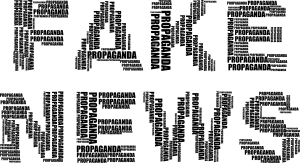
In The Medium Is The Message by Marshall McLuhan (YouTube), he emphasised the significance of how the different mediums through which mass media are transmitted impact on messages and people. For instance, during the genocide in Ruwanda radio as a medium was used to a very catastrophic effect, such that it sets the whole nation into a spiral effect of ethnic cleansing on a large scale. But the mediums that McLuhan talked about (YouTube) or the one – radio – used during the genocide in Ruwanda can mainly be used to transmit messages by a few individuals, operated by a selected few individuals and owned or sponsored for transmission purposes by affluent or influential individuals or organisations. However, the mediums in the era of social media are owned by anyone with an access to internet connection and a mobile device, and transmission on social media is as easy as touching or clicking a send or enter tab or key on a screen – laptop, PC, tablet or mobile phone; and herein lies the dangers of the era of social media of YouTube, Facebook, Twitter, Instagram etc.
So why am I talking about social media, McLuhan’s The Medium is the Message or the genocide that happened in Ruwanda over twenty-five years ago? It’s because the BBC just released a comprehensive magazine report – Like. Share. Kill. – on the deadly impacts the abuse of the use of social media in Nigeria is causing in exacerbating ethnic and religious clashes that have led to the deaths of tens or hundreds, if not thousands, of people in the country. As educators, parents, adults, responsible individuals and citizens, we owe it to our collective sanity, security, safety and social cohesion to be mindful of what we share, like, retweet or comment (positively) on in any of social media space we exist on, either: synchronous or asynchronous, public or private. Individuals need to be mindful of how easy it is for agents of destruction, bigotry and hatred to easily prey, prowl and pounce on emotional sentiments, prejudices and unconscious biases to achieve their demonic goals of creating breakdown of law and order: within families, between friends, among neighbours and communities, in order to create an environment of fear that thrives on hatred and despondency.
In the past I wrote about the dangers that the nature of political discourse on Nigeria’s political issues were taking, and recently in a podcast interview – Conservation Education in Nigeria – that I conducted with Dr Olalekan Adekola of York St. John University in the UK, I mentioned how grotesque, gory and disturbing some of the images that people share on Twitter Nigeria could be; and I wondered aloud in the podcast interview if Twitter has a special law for the type of images that are allowed to be shared on Twitter Nigeria. And I really do wonder how any individual can expect some of the comments, images or videos that are shared on Nigeria’s social media spaces could be of any positive outcome or use for the common good of anyone or everyone.
Furthermore, educators, parents and guardians of children and young people need to start educating them on: how to identify fake news, the dangers inherent in accessing social media and how they shouldn’t do what they can’t do in public spaces or share publicly in their physical world on social media, because their social media’s world is an extension of their physical world. Most importantly, for educators, parents and guardians, all social media platforms have age limits at which an individual can sign up, please make sure that you don’t allow children that are below the permitted age limit access any of the social media platforms, and always monitor their access and use of internet. The reality is that it is high time that as individuals and collectively as a society we take up the moral, ethical and social responsibility to decline to share any media item that we think might be: fake news, not dignifying, socially, morally or ethically unhelpful or destructive. Also, we need to start challenging people that share such media items whenever we come across such items on our timelines, and we should not hesitate to report such media items to the operators of the social media platforms we find them on. More often than not, such items only need flagging as offensive and we would have made our own contribution of being socially responsible.
Finally, for education policy makers, school administrators and proprietors, and teachers, it is high time that the study of digital literacy is made a core requirement of the curriculum that schools offer in the country and part of the educational experience that children and young people access in the country’s education system. And as for the existing gross abuse of the use of these social media outlets, it is important that the government act swiftly and the traditional mass media outlets should reach out to the general public through public enlightenment programmes, and this is where the technology hubs, social media enterprises and social media companies have to play their own very important roles in supporting the traditional media outlets and security agents in the country with know-how and finance to implement a mass digital literacy programme in the country.
Please, leave your thoughts on this post in the comment section and feel free to share the article/podcast with your contacts. Thanks for taking out of your precious time to read/listen to my article/podcast!
If you like this post, kindly subscribe and/or follow me on Twitter @otukogbe and @EdusoundsNg or on Facebook at edusoundsng.